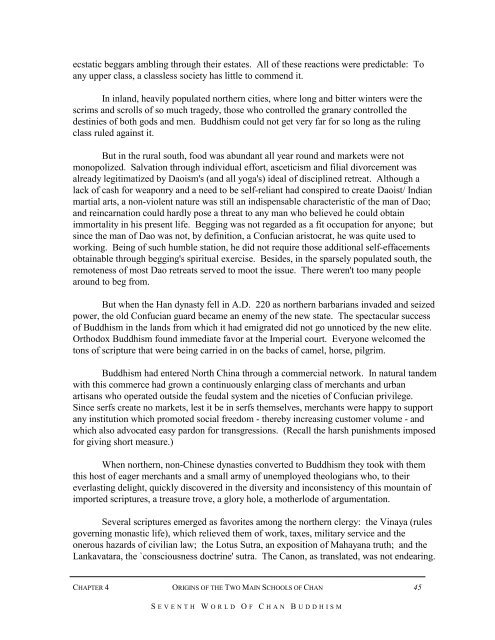seventh world of chan buddhism - Zen Buddhist Order of Hsu Yun
seventh world of chan buddhism - Zen Buddhist Order of Hsu Yun
seventh world of chan buddhism - Zen Buddhist Order of Hsu Yun
Create successful ePaper yourself
Turn your PDF publications into a flip-book with our unique Google optimized e-Paper software.
ecstatic beggars ambling through their estates. All <strong>of</strong> these reactions were predictable: To<br />
any upper class, a classless society has little to commend it.<br />
In inland, heavily populated northern cities, where long and bitter winters were the<br />
scrims and scrolls <strong>of</strong> so much tragedy, those who controlled the granary controlled the<br />
destinies <strong>of</strong> both gods and men. Buddhism could not get very far for so long as the ruling<br />
class ruled against it.<br />
But in the rural south, food was abundant all year round and markets were not<br />
monopolized. Salvation through individual effort, asceticism and filial divorcement was<br />
already legitimatized by Daoism's (and all yoga's) ideal <strong>of</strong> disciplined retreat. Although a<br />
lack <strong>of</strong> cash for weaponry and a need to be self-reliant had conspired to create Daoist/ Indian<br />
martial arts, a non-violent nature was still an indispensable characteristic <strong>of</strong> the man <strong>of</strong> Dao;<br />
and reincarnation could hardly pose a threat to any man who believed he could obtain<br />
immortality in his present life. Begging was not regarded as a fit occupation for anyone; but<br />
since the man <strong>of</strong> Dao was not, by definition, a Confucian aristocrat, he was quite used to<br />
working. Being <strong>of</strong> such humble station, he did not require those additional self-effacements<br />
obtainable through begging's spiritual exercise. Besides, in the sparsely populated south, the<br />
remoteness <strong>of</strong> most Dao retreats served to moot the issue. There weren't too many people<br />
around to beg from.<br />
But when the Han dynasty fell in A.D. 220 as northern barbarians invaded and seized<br />
power, the old Confucian guard became an enemy <strong>of</strong> the new state. The spectacular success<br />
<strong>of</strong> Buddhism in the lands from which it had emigrated did not go unnoticed by the new elite.<br />
Orthodox Buddhism found immediate favor at the Imperial court. Everyone welcomed the<br />
tons <strong>of</strong> scripture that were being carried in on the backs <strong>of</strong> camel, horse, pilgrim.<br />
Buddhism had entered North China through a commercial network. In natural tandem<br />
with this commerce had grown a continuously enlarging class <strong>of</strong> mer<strong>chan</strong>ts and urban<br />
artisans who operated outside the feudal system and the niceties <strong>of</strong> Confucian privilege.<br />
Since serfs create no markets, lest it be in serfs themselves, mer<strong>chan</strong>ts were happy to support<br />
any institution which promoted social freedom - thereby increasing customer volume - and<br />
which also advocated easy pardon for transgressions. (Recall the harsh punishments imposed<br />
for giving short measure.)<br />
When northern, non-Chinese dynasties converted to Buddhism they took with them<br />
this host <strong>of</strong> eager mer<strong>chan</strong>ts and a small army <strong>of</strong> unemployed theologians who, to their<br />
everlasting delight, quickly discovered in the diversity and inconsistency <strong>of</strong> this mountain <strong>of</strong><br />
imported scriptures, a treasure trove, a glory hole, a motherlode <strong>of</strong> argumentation.<br />
Several scriptures emerged as favorites among the northern clergy: the Vinaya (rules<br />
governing monastic life), which relieved them <strong>of</strong> work, taxes, military service and the<br />
onerous hazards <strong>of</strong> civilian law; the Lotus Sutra, an exposition <strong>of</strong> Mahayana truth; and the<br />
Lankavatara, the `consciousness doctrine' sutra. The Canon, as translated, was not endearing.<br />
CHAPTER 4 ORIGINS OF THE TWO MAIN SCHOOLS OF CHAN<br />
S EVENTH W ORLD O F C HAN B UDDHISM<br />
45


